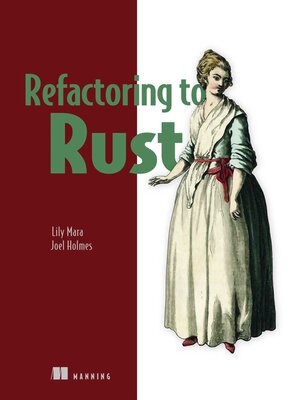
Sign up to save your library
With an OverDrive account, you can save your favorite libraries for at-a-glance information about availability. Find out more about OverDrive accounts.
Find this title in Libby, the library reading app by OverDrive.



Search for a digital library with this title
Title found at these libraries:
| Library Name | Distance |
|---|---|
| Loading... |
Don't rewrite from scratch! Improve your software speed and scalability by iteratively replacing performance-critical code with Rust
Refactoring to Rust helps you get the speed and reliability of Rust libraries, functions, and high-performance features without needing a complete rewrite of your codebase.
In Refactoring to Rust you will learn to:
Create Rust libraries you can call from other programming languages
Integrate Rust functions with code in other languages
Use Rust's ownership and borrowing system to write high performance code
Handle errors as values using Rust's enums
Minimize unnecessary memory usage with Rust's multiple string types
Boost performance with Rust concurrency and async event processing
Create Rust HTTP services
Rust is designed to gradually replace other languages by integrating and decomposing existing code. Refactoring to Rust helps you take full advantage of this amazing feature, even if you've never coded in Rust before. You'll learn practical code-mixing techniques like embedding Rust libraries into apps written in other languages.
About the technology
Upgrade your software without starting from scratch! By incrementally introducing Rust into your codebase, you can upgrade key features and improve the performance of almost any application. This book shows you how to create standalone Rust libraries, boost speed and stability by using Rust for concurrency, and create safe, memory-efficient low-level code.
About the book
Refactoring to Rust shows you exactly where and how to integrate Rust surgically into applications written in another language. You'll start by reviewing Rust's unique syntax and concepts, with special emphasis on unique language features like variable lifetime and ownership. Then, you'll learn to use Rust to wrap dangerous code, call standard and custom Rust libraries, and even use WASM to run Rust in the browser.
What's inside
Create Rust libraries you can call from other languages
Handle errors as values using Rust's enums
Optimize for memory efficiency
Boost performance with Rust concurrency
About the reader
For intermediate programmers. No Rust experience required.
About the author
Lily Mara is a software engineer focused on high-performance Rust applications. Joel Holmes is a software developer building cloud native applications. He is the Author of Shipping Go, and Co-Author of Go in Action, Second Edition.
Refactoring to Rust helps you get the speed and reliability of Rust libraries, functions, and high-performance features without needing a complete rewrite of your codebase.
In Refactoring to Rust you will learn to:
Rust is designed to gradually replace other languages by integrating and decomposing existing code. Refactoring to Rust helps you take full advantage of this amazing feature, even if you've never coded in Rust before. You'll learn practical code-mixing techniques like embedding Rust libraries into apps written in other languages.
About the technology
Upgrade your software without starting from scratch! By incrementally introducing Rust into your codebase, you can upgrade key features and improve the performance of almost any application. This book shows you how to create standalone Rust libraries, boost speed and stability by using Rust for concurrency, and create safe, memory-efficient low-level code.
About the book
Refactoring to Rust shows you exactly where and how to integrate Rust surgically into applications written in another language. You'll start by reviewing Rust's unique syntax and concepts, with special emphasis on unique language features like variable lifetime and ownership. Then, you'll learn to use Rust to wrap dangerous code, call standard and custom Rust libraries, and even use WASM to run Rust in the browser.
What's inside
About the reader
For intermediate programmers. No Rust experience required.
About the author
Lily Mara is a software engineer focused on high-performance Rust applications. Joel Holmes is a software developer building cloud native applications. He is the Author of Shipping Go, and Co-Author of Go in Action, Second Edition.







